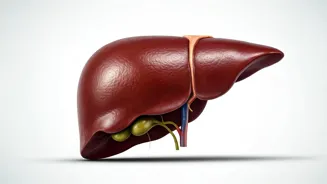Early Warning Signs
The liver, a powerhouse of the body, can sometimes struggle with its duties. Fatty liver disease is a common condition where the liver accumulates excessive
fat. Early detection is critical, and the body often provides clues through subtle symptoms. One of the initial signs can be fatigue, a general feeling of tiredness and lack of energy that persists despite adequate rest. This exhaustion is often accompanied by discomfort in the upper right abdomen. This might manifest as a dull ache or pressure, a direct consequence of the liver's inflammation. Other potential symptoms include digestive issues such as bloating and gas, which can disrupt daily life. Dark urine, a change in the color of your urine, indicates the liver isn't working properly. Lastly, unexplained weight loss and changes in skin or eye color, such as yellowing (jaundice), can also point to the liver's struggle.
The Fatty Liver
Fatty liver is a condition marked by the buildup of fat within the liver cells. This accumulation can hinder the liver's ability to function. While some fat in the liver is normal, excessive amounts signal a health issue. There are two main types: non-alcoholic fatty liver disease (NAFLD) and alcoholic fatty liver disease. NAFLD is more common, affecting individuals who may not consume significant alcohol. Several factors contribute to NAFLD, including obesity, type 2 diabetes, and high cholesterol. Alcoholic fatty liver disease, as the name implies, is associated with heavy alcohol consumption. The progression of fatty liver disease can vary. If left unaddressed, it can lead to inflammation, scarring (cirrhosis), and even liver failure. Prevention and early intervention are essential to mitigate these risks.
Lifestyle Adjustments
Lifestyle plays a vital role in liver health. Diet and exercise are at the forefront of preventative and treatment strategies. A balanced diet rich in fruits, vegetables, and whole grains is beneficial. Limiting processed foods, sugary drinks, and excessive saturated fats can ease the liver's burden. Regular exercise is also crucial. Aim for at least 150 minutes of moderate-intensity exercise or 75 minutes of vigorous-intensity exercise per week. Moderate alcohol consumption, or abstinence, is also recommended, as excessive alcohol intake is a known risk factor. Managing underlying health conditions, such as diabetes and high cholesterol, through medication and lifestyle changes, can also improve liver health. Regular health check-ups are essential for early detection and intervention.
Dietary Strategies
Your diet has a significant influence on the health of your liver. Certain foods are beneficial for supporting liver function and reducing fat accumulation. Incorporate foods rich in antioxidants, such as berries, leafy greens, and colorful vegetables, to protect liver cells from damage. Include lean protein sources, like fish and poultry, to support overall health without overburdening the liver. Healthy fats from sources like avocados, nuts, and olive oil can also be included in moderation. On the other hand, you should limit or avoid processed foods, sugary drinks, and foods high in saturated and trans fats. Consider incorporating liver-friendly foods like coffee and green tea, which have been linked to improved liver health in moderation. Be mindful of portion sizes to maintain a healthy weight, as obesity is a risk factor for fatty liver disease.
Detox and Support
While the liver is designed to detoxify the body, some habits and supplements can support its function. Drinking adequate water is crucial for overall health and helps flush out toxins. While there is no single 'detox' diet, focusing on nutrient-rich foods naturally supports the liver's processes. Certain supplements, such as milk thistle and turmeric, are known for their potential liver-protective properties; however, you should consult a healthcare professional before taking any supplements. Avoid excessive alcohol consumption and limit exposure to toxins from environmental sources. Regular exercise improves liver health and overall well-being.
Medical Consultations
If you suspect you have a fatty liver or experience any concerning symptoms, it is essential to consult a healthcare professional. They can perform blood tests, imaging scans (such as an ultrasound), and a physical examination to assess the health of your liver. Based on the assessment, they can provide a diagnosis and recommend appropriate treatment options. Treatment plans may involve lifestyle modifications, medications to manage underlying conditions, or in severe cases, specialized care. Regular follow-up appointments and monitoring will be essential. By seeking medical advice and following the recommendations of healthcare professionals, you can take proactive steps to improve your liver health and overall well-being. Your doctor can give tailored advice.













